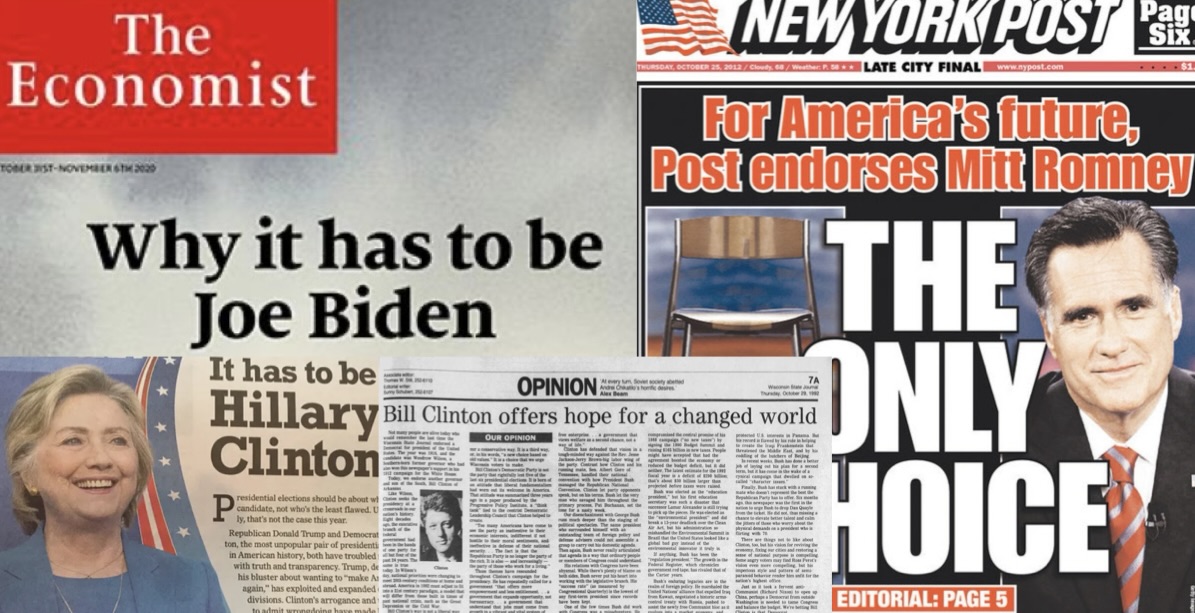
About the author : paulwesslundwriter
Paul Wesslund spent a career writing and editing for newspapers and in the energy industry. When he retired in 2015 he went on to write two books on how kindness and integrity leads to success, wrote a monthly energy column, became an environmental organizer, and got involved in the leadership of his church.
Subscribe To My Blog
Share This Story, Choose Your Platform!
When two major newspapers decided not to endorse a presidential candidate, we lost a little bit more of our sense of community
The Washington Post and The Los Angeles Times have received a lot of deserved criticism for their recent decisions to not endorse a presidential candidate this year. The reactions have included subscription cancellations and editor resignations over what the protesters see as bad journalism.
It’s also bad business.
Those two papers, whose job is current events, just took themselves out of the nation’s top-of-the-mind discussion in a deep and little-recognized way.
It’s no secret newspapers have been declining. Circulation fell off a cliff starting about 1993, not-so-coincidentally the year the World Wide Web launched. In those 30 years the number of papers printed fell from more than 120 million, to about 20 million today.
Newspapers are also on the internet, but that hasn’t changed the basic, bleak picture. Online newspaper visitors hover around 10 million, and they tend to spend less than two minutes at a time on the paper’s website. In business terms, online income has been added as a revenue stream, but the net bottom line for newspapers is still on a downward slope.
What those statistics don’t show is the value of what we’re losing—a shared source of information. We don’t agree any more about what’s true.
As we retreat to our TV narrowcasts and comfortable corners of the internet, we’re developing our own versions of reality, rather than a national community.
Newspaper political endorsements offer an antidote to that social fragmentation.
Creating space for respectful discussion
One of the main unique business assets of a newspaper is that it is a recognized collection point of information. That information, and the people who have been trained to assemble it and check it for accuracy, provide a sorely needed resource for organizing and giving perspective to that information. A well-written, well-researched candidate endorsement isn’t important for telling us how to vote—we make up our own minds about that. Instead, it checks our thinking against a carefully considered set of criteria. It creates a space for civilized and respectful discussion and debate. It’s a town square. It’s a community.
Media reports indicate that the non-endorsement decisions were made by the billionaire businessmen owners of the papers. It’s odd to me these ridiculously successful guys would sacrifice one of their key assets. We’re blanketed with companies trying to create community around themselves: using customer loyalty programs, asking us to “like” them on Facebook, or running TV ads with engaging car spokespeople and funny personalities charming us into buying insurance or beer.
With newspaper cutbacks of staff over the past three decades, a lot of news outlets no longer have the editorial expertise to properly do the thoughtful analysis required to write the kind of community-creating endorsements I’m describing. The saddest part the of the non-endorsements by The Times and The Post is that they did have those resources.
As newspapers continue their decline, it’s hard to see how giving up the unique power of an endorsement will be good for the business of newspapers, or the nation.
